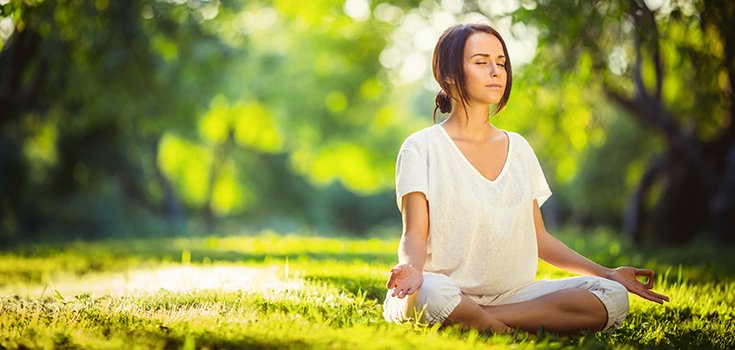Studies Suggest Yoga Helps Depression Sufferers Feel Better

Can the slow, gentle ebb and flow of yoga help people suffering with depression feel better and even overcome unhealthy eating habits? Four separate studies presented in August, 2017 at the 125th Annual Convention of the American Psychological Association suggest that the answer is “Yes.” [1]
Hatha Yoga
In one study, led by psychologist Lindsey Hopkins, PhD, of the San Francisco VA Medical Center, 23 male veterans with elevated depression scores who participated in hatha yoga twice a week for 8 weeks saw significant improvements in their symptoms. [2]
Hatha yoga zeroes in on physical exercises and meditative and breathing exercises.
According to The Sanatan (Yoga) Society, hatha yoga focuses on “concentrating on the practice of postures (asanas) and breath control (pranayama) to energize the subtle channels (nadis) in the body.” [3]
Bikram “Hot” Yoga
Another study involved Bikram or “hot” yoga, an offshoot of hatha yoga. Bikram yoga consists of 26 postures and 2 breathing exercises. It earned the nickname “hot” yoga because, unlike hatha yoga, Bikram is practiced in a room heated to 105 degrees Fahrenheit with 40% humidity. The steamy temperature helps maximize detoxification, helps oxygen travel to the tissues of the body, and protects the body through malleability (flexibility). [3]
For this study, Sarah Shallit, MA, from Alliant International University and co-author Hopkins divided a cohort of 52 women between the ages of 25 and 45 into two groups. Half of the women were able to take the Bikram classes right away, while the other half was placed on a wait-list. [4]
Not surprisingly, the group that was able to take the class reported sharply reduced symptoms of depression, compared to those on the wait-list. What’s more, the participants who took the yoga classes found that they had an easier time controlling discombobulated or emotional eating patterns that can trip up even the most health-conscious people.

Read: Yoga for Depression and Anxiety – Help Without Drugs
The third study, by Maren Nyer, PhD, and Maya Nauphal, BA, of Massachusetts General Hospital, was a similar experiment. It involved 29 adults, all taking Bikram classes twice weekly for 8 weeks. The researchers found that the participants’ depression symptoms improved and that the participants felt their quality of life had improved, including in optimism and mental and physical functioning. [1]
And in another study, conducted by Nina Vollbehr, MS, of the Center for Integrative Psychiatry in the Netherlands and colleagues, 74 mildly depressed university students were asked to follow a 15-minute instructional yoga video at home for 2 months. They, too reported a dramatic improvement in mood. [1] [5]
Hopkins said in a statement:
“Yoga has become increasingly popular in the West, and many new yoga practitioners cite stress-reduction and other mental health concerns as their primary reason for practicing. But the empirical research on yoga lags behind its popularity as a first-line approach to mental health.” [5]
She went on:
“At this time, we can only recommend yoga as a complementary approach, likely most effective in conjunction with standard approaches delivered by a licensed therapist. Clearly, yoga is not a cure-all. However, based on empirical evidence, there seems to be a lot of potential.” [2]
Sources:
[1] American Psychological Association
[2] HealthDay
[3] One Green Planet
[4] PopSugar

This guy has a video named “the reason for the yoga trend”… watch it